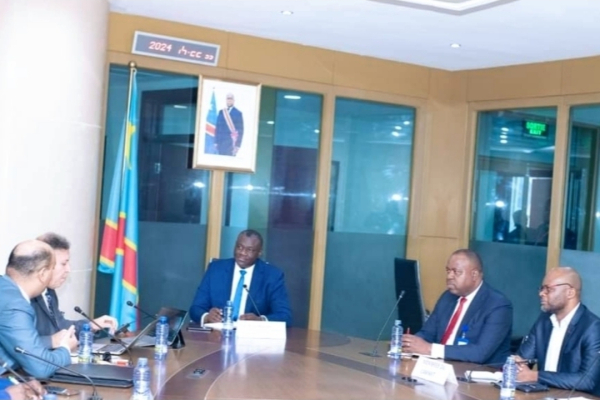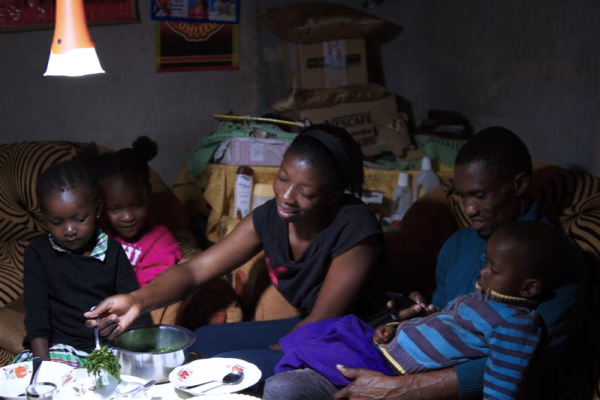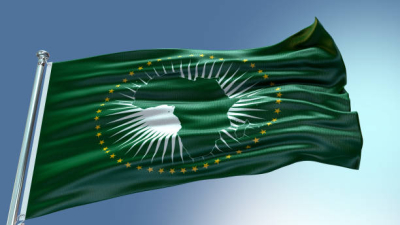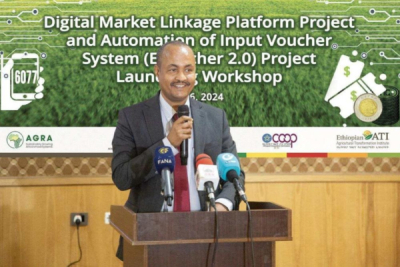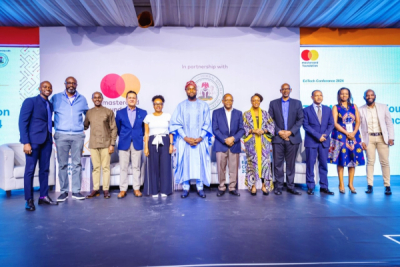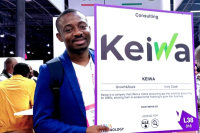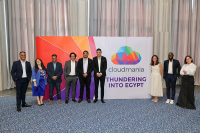In 2019, the Democratic Republic of Congo (DRC) adopted a National Digital Plan to guide the development of its digital economy. This strategic framework aims to foster digital transformation across various sectors, enhancing economic growth and improving public services, with various initiatives already being carried out to advance the plan.
The Democratic Republic of Congo (DRC) is exploring the establishment of a National Unified Information Center, according to a statement from the Ministry of Posts, Telecommunications, and Digitalization (PT-N).
Minister Augustin Kibassa Maliba (photo, center) met with Ashraf Attia, President of the Egyptian technology group Omega Gate Tech, on July 18 to discuss the initiative. According to Khaled Rhaïem, Omega Gate Tech's DRC representative, the discussions aligned with the DRC's ongoing digital transformation strategy.
"We discussed the construction of the National Unified Information Center. This approach perfectly aligns with President Félix Tshisekedi's vision. The center will consolidate all census databases and implement 5G technology," Rhaïem said.
The proposed center aligns with the National Digital Plan Horizon 2025 (PNN 2025), which aims to modernize the DRC through accelerated digitalization and key infrastructure development with 48% of its 69 projects already underway, 15 completed and 18 in the operationalization phase (according to the PNN 2025 mid-term review published in December 2023).
The National Unified Information Center envisions a centralized platform for collecting, managing, and disseminating critical national data across sectors like security, health, education, and the economy.
Omega Gate Tech, with its presence in Egypt, UAE, Libya, and Saudi Arabia, is seen as a potential partner to support the DRC's digital transformation. Their involvement could pave the way for significant technological advancements and a promising digital future for the country.
Samira Njoya
d.light, a global provider of affordable household products and finance for low-income households, has secured a $176 million securitization facility to purchase receivables in Kenya, Tanzania, and Uganda.
Announced on July 17, this financing from African Frontier Capital will help d.light expand its PayGo consumer finance offering, making solar-powered products accessible to more low-income households and communities without electricity.
Over the next three years, the facility will provide reliable, renewable energy to an estimated six million people across the three countries.
The African Union (AU) will assess the Continental Artificial Intelligence Strategy and the African Digital Compact on July 18–19, 2024, in Accra, Ghana. This follows the roadmap's endorsement by African ICT and Communications Ministers in June.
The Continental AI Strategy and the African Digital Compact aim to accelerate Africa’s digital transformation through new technologies for sustainable development, economic growth, and societal well-being. It will position Africa as a leader in the global digital economy, promoting homegrown digital solutions through a strong talent pool and public-private partnerships.
Ethiopian authorities are aiming to capitalize on their agricultural sector by modernizing it. To achieve this, they are implementing projects to digitize the sector.
The Ethiopian Agricultural Transformation Institute (ATI) on Tuesday launched two digital initiatives in partnership with the Alliance for a Green Revolution in Africa (AGRA) to enhance agricultural input and output market systems.
The first project involves the creation of a digital platform that will connect smallholder farmers with potential buyers. "This initiative modernizes the agricultural market system, improving price discovery, risk management, and transaction transparency. It ensures a consistent supply of quality products, promotes traceability, matches supply with demand, and stabilizes market prices," explained the ATI.
The second project focuses on automating the input voucher system. The ATI is introducing eVoucher 2.0, electronic vouchers with a digital code that can be used to purchase goods or services online or in stores. The adoption of this system is expected to enhance the distribution of agricultural inputs and combat fraud.
These projects are part of a broader effort by Ethiopian authorities to modernize the agricultural sector. They have signed various partnerships to achieve this goal, confirming their intention to leverage technology for agricultural advancement. In June, the ATI partnered with Digital Green, a U.S.-based organization promoting the digitization of agriculture, to develop a knowledge-sharing platform.
The launched projects will help ensure a sustainable market, improve the supply of inputs to farmers, and strengthen the connections between farmers and agricultural product consumers.
Adoni Conrad Quenum
He aims to reduce wait times for patients seeking medical attenetion. To achieve that goal, he developed a WhatsApp chatbot designed to connect healthcare providers directly with patients.
Blessing Museki (photo), a renowned Zimbabwean computer scientist and entrepreneur, is the founder of Cloomi, an innovative tech startup that connects people to healthcare providers. Launched in 2023, Cloomi offers a WhatsApp chatbot that anonymously links Zimbabweans with various healthcare providers, including pharmacies, medical laboratories, and diagnostic imaging centers. Through this app, patients can check the availability of services and compare prices. They also receive the physical address of providers, a location map, and the WhatsApp number of the selected business.
"We have made over 10,000 successful matches since launch, with users receiving responses within minutes during the day on regular working days," stated Blessing Museki in July 2024. The platform currently features more than 230 pharmacies, over 20 medical laboratories and diagnostic imaging centers, and a database of more than 700 registered healthcare practitioners across Zimbabwe.
Blessing Museki is also a chatbot developer for BNP Paribas. Before founding Cloomi, he co-founded Joblock in 2019, a platform that enables job seekers to manage and share their professional references securely. In 2020, he co-founded SwiftLog and Freshslate.app. SwiftLog is a platform that facilitates the recording of water and electricity meter readings via smartphone, while Freshslate.app allows users to store and share their COVID-19 test results.
Blessing Museki graduated from the University of Zimbabwe in 1999 with a bachelor's degree in mathematics and computer science. He also holds a master's degree in financial markets with information systems, obtained in 2007 from London Metropolitan University. He gained experience by working for several years as a developer for companies such as Econet Wireless, London Stock Exchange Group, Transport for London, and M&G Investments.
Melchior Koba
Information and Communication Technologies (ICT) provide greater opportunities for creativity and learning at preschool and primary levels. However, access to digital education remains insufficient in Africa due to the lack of preparedness for integrating digital technologies into early learning.
The Mastercard Foundation, in partnership with the Federal Government of Nigeria, hosted its first EdTech conference in Abuja from Monday, July 8 to Wednesday, July 10. Themed "Education Tech for Resilient, Inclusive Learning In Africa," the conference aimed to discuss the integration of technology into learning systems across Africa.
The event concluded with the adoption of 10 key actions to strengthen the EdTech ecosystem in Africa:
Champion local innovation through supportive EdTech policies, with governments as leaders, proactive enablers, and consumers of quality content and delivery mechanisms.
Harmonize cross-sector policy by coordinating inter-ministerial strategies, plans, and initiatives on technology-enabled access to education for all.
Underwrite foundational infrastructure through creative use of resources such as Universal Service Funds to invest in electricity, the internet, devices, and dedicated infrastructure for education programs.
Drive decisions with data by investing in government systems and capabilities for timely collection, analysis, and informed decision-making.
Enhance delivery capacity along the EdTech value chain by upskilling teachers to deliver learning using EdTech and supporting leaders in education systems to work with tech-enabled processes and data.
Systematize EdTech integration by introducing (where nonexistent) and enforcing clear, context-relevant standards for technology integration into the educational curriculum.
Guide context-relevant innovation with clear and timely guidelines and approval processes for content, tools, and licenses to encourage innovation, investment, and technology mainstreaming.
Diversify learning pathways for out-of-school youth by developing flexible technology-enabled alternatives for learning, accredited certification, and re-entry to the formal education system.
Lower access barriers to EdTech through strategic private-public partnerships that support responsive, evidence-based policy and affordable solutions for all.
Embed responsive inclusivity (gender equity, persons with disabilities and refugees and displaced persons) in policy and innovation processes, centering and engaging diverse young people throughout development and delivery.
The conference is part of the Mastercard Foundation's efforts to promote digital education in Africa. It coincides with the African Union's declaration of 2024 as the "Year of Education," urging all governments to intensify efforts to ensure quality education for all.
The African Union's Digital Education Strategy (2023-2028) and its implementation plan call for African countries to develop national digital education strategies. They aim for at least 50% of educational institutions to have safe and secure high-speed connectivity at significantly less than $25 per Mbps per month, at least 20% of students and 50% of teachers on the continent to have access to digital devices by 2027, and one-third of students and all teachers to have access by 2030.
Samira Njoya
In recent years, health tech startups have been providing valuable alternatives to populations. In Zambia, a tech entrepreneur has taken a significant step to facilitate access to health sector information by launching a digital solution.
MedSearch Zambia is an e-health solution developed by a Zambian startup. It enables users to access comprehensive information related to the health sector in the country. Founded in 2018 by Zanga Musakuzi and based in the capital Lusaka, the startup aims to enhance how Zambian populations search for healthcare services.
"We have developed a medical directory application, which works as a health information Hub and guide that allows users who are in search of specific health services or medication to quickly and easily find one near them regardless of their location," the startup states.
Its mobile application is available on iOS and Android and has been downloaded over a thousand times from the Play Store. After downloading, users create an account to access MedSearch Zambia's healthtech services. To ensure credibility and reliable information on its web and mobile platforms, the app partners with a wide range of healthcare providers, including pharmacies, hospitals, clinics, and even agroveterinary service providers.
Beyond providing health sector information, the startup offers medical research advice, customized training for organizations, and a "Water and Sanitation" department. It also features a medical tourism service that enables people to seek treatment in India.
Adoni Conrad Quenum
He aims to help small and medium-sized enterprises manage their accounting more efficiently. To achieve this goal, he has developed an innovative technological solution that automates financial management.
Fabrice Koffi, an Ivorian accountant and entrepreneur, is the co-founder and CEO of Keiwa, a startup that supports African entrepreneurs by providing management tools tailored to their needs.
Launched in 2018 by Koffi, Bertrand Dago, and Terrence Kondou, Keiwa is a simplified accounting application that promotes financial inclusion for businesses. It offers financial and inventory management services suitable for all types of activities, addressing the needs of daily operations tracking.
Keiwa enables users to create quotes and invoices, automatically record sales and expenses, manage inventory and credits, and access real-time financial reports. The application also facilitates the archiving of supporting documents and important records, making them easy to retrieve. Keiwa is currently available in Senegal and Côte d'Ivoire.
The application is a project of Dathan Group, a company founded in 2015 to support small and medium-sized enterprises (SMEs) in managing their activities. Thanks to Keiwa, Dathan Group was awarded the jury's favorite prize at the "L'Arbre à Palabres" hackathon organized by Société Générale's Lab Innovation Afrique in 2017.
Fabrice Koffi graduated from Sup'Management University in Morocco with a bachelor's degree in accounting and finance in 2017. In 2013, he worked as an accountant at Société d'expertise comptable et de conseil (SECC) in Côte d'Ivoire. In 2015, he became a partner and co-manager at Cabinet UTC, a consultancy firm supporting SME development. In 2016, he became the head of accounting at AgriTecno, a company manufacturing biostimulants and plant nutrients.
Melchior Koba
Africa is the world's youngest continent, with over 60% of its 1.4 billion people under 25. This youth demographic offers a significant opportunity to nurture a tech-savvy generation that can lead the continent's digital future and drive economic growth. However, many African organizations still struggle to find the necessary tech skills to support their digital transformation efforts.
Nigerian Software solutions provider CodeGarageAfrica launched the "1000 Lines of Code" initiative on July 15 in Ibadan, Nigeria. The initiative aims at empowering 1000 senior secondary students through technology and is set to inspire and educate the next generation of tech enthusiasts.
1000 Lines of Code Commences Today!
— codegarage_africa (@CodegarageA) July 15, 2024
We are thrilled to announce the commencement of the #1000LinesofCode event today!
A big thank you to our amazing partners:@oyostategovt@386konsult @zeeh_africa
Stay tuned for updates and highlights as we kickstart!#CodeGarageAfrica pic.twitter.com/5AxvMnfQFx
The event, held at the International Conference Center in Ibadan will last a week, from July 15 to July 19, 2024. It introduces 1000 senior secondary students from 110 schools across 11 local governments in Ibadan to coding and technology. The program features hands-on workshops, industry talks, and interactive sessions designed to ignite a passion for computer science. Participants will engage in coding challenges, receive mentorship, and explore software development.
A 2022 report by SAP Africa, an enterprise software and software-related services provider, titled "Africa’s Tech Skills Scarcity Revealed," highlights that four in five organizations across the continent are negatively impacted by a lack of tech skills. In Nigeria, all surveyed organizations reported some effect from this skills gap, with 47% experiencing employee turnover or the risk thereof due to inadequate tech skills, and 60% suffering customer loss for the same reason. Bridging this gap is crucial for Africa's digital transformation and economic growth.
Hikmatu Bilali
Liquid C2, a subsidiary of Liquid Intelligent Technologies has expanded its Cloudmania business into Egypt, the leading pan-African technology group announced on July 16.
Cloudmania is an award-winning distribution unit for cloud and cyber security solutions. It operates in 35 countries across the Middle East and Africa.
The company provides innovative cloud technology, enabling businesses to deliver superior solutions to customers.
More...
In recent years, Morocco has embarked on a digital transformation, marked by the modernization of various sectors, including higher education. With the support of partners, these advancements are becoming increasingly tangible.
Morocco secured a €120 million loan from the African Development Bank (AfDB) to digitize its universities, according to a financing agreement signed in Rabat on Tuesday, July 16.
The agreement was signed by Achraf Hassan Tarsim, AfDB's country manager for Morocco, and Nizar Baraka, Morocco's Minister of Higher Education, Scientific Research, and Innovation.
The funds will be used to develop and implement new university training programs in digital fields. These programs will be tailored to meet job market needs and the expectations of national and international investors. Additionally, universities will be equipped with new computer hardware and their services will be digitized.
This €120 million loan is part of a larger €604 million AfDB financing package for Morocco. The other allocations include €200 million for the Territorial Competitiveness Improvement Program, €200 million for the construction of the 104-kilometer Guercif-Nador highway and €84 million for the Integrated and Sustainable Development Support Project for Forest Areas.
The Moroccan government views this investment in university transformation as key to achieving the goals of its Plan for Accelerating the Transformation of the Higher Education, Scientific Research, and Innovation Ecosystem (ESRI 2030). Launched in 2020, ESRI 2030 aims to create a high-performing and attractive higher education system aligned with the country's needs. It emphasizes incorporating entrepreneurship into curricula and promoting excellence and innovation.
Morocco has set ambitious targets: graduating 22,500 students annually by 2027 and increasing the number of graduates with digital specializations or competencies across all disciplines and levels to 50,000 by 2035.
Samira Njoya
Tech services provider TD Africa and Cisco recently launched a month-long training program under the TD Academy banner to tackle Africa's technology skills gap.
The program, “Introduction to Cisco Networking Solutions and Workplace Professional Skills,” aims to tackle Africa’s technology skills gap. It combines technical training with vital soft skills, providing participants with a well-rounded skill set for today’s job market.
Driven by a commitment to empowering small African farmers, he has developed a technological platform that connects them to agricultural markets and financing opportunities. The platform aims to address their challenges with innovative solutions.
Francis Obirikorang, a Ghanaian entrepreneur, is the co-founder and CEO of AgroCenta Technologies, a fintech company dedicated to the financial inclusion of rural communities in Africa.
Founded in 2015 by Obirikorang and Michael Ocansey, AgroCenta Technologies aims to improve market access and financial services for smallholder farmers across the continent. The company offers digital payments, loans, insurance, and pensions for these farmers.
To achieve its objectives, the startup developed Velociti, a platform that leverages big data, machine learning, and artificial intelligence. Velociti constructs alternative data to enable small rural farmers to access financial services such as microloans, mobile payments, insurance, savings, and pensions. It also provides a digital identity for stakeholders in Africa's agricultural value chain.
In addition to AgroCenta Technologies, Obirikorang co-founded Swappaholics Holdings Ltd in 2015, where he served as CEO until 2016. This company developed an online platform allowing individuals and businesses to exchange products, skills, and services without using money.
Obirikorang graduated from Kwame Nkrumah University of Science and Technology in 2006 with a bachelor's degree in materials engineering. Before venturing into entrepreneurship, he worked from 2008 to 2013 as a technical writer for tech companies Esoko and Corenett, and from 2013 to 2015 as a business analyst at TXT Ghana, a wireless application service provider.
Melchior Koba
Ensuring consistent and improved satellite services is vital for supporting digital transformation efforts across African nations. By leveraging advanced satellite technology, the continent can effectively bridge the digital divide and drive economic growth.
The Nigerian Communications Satellite Limited (NIGCOMSAT) is set to replace its aging communications satellite, NIGCOMSAT-1R. To this end, it seeks global investors and collaborators for the project. This move, announced by Managing Director Jane Nkechi Egerton-Idehen, on July 14, comes as NIGCOMSAT-1R nears the end of its 15-year lifespan in 2026.
Operational since 2011, NIGCOMSAT-1R is essential to Nigeria's communications infrastructure. The NigComSat-1R satellite was launched to replace the failed NigComSat-1 in 2007. To maintain and enhance service, NIGCOMSAT plans to develop NIGCOMSAT-2 and NIGCOMSAT-3. The two new satellites will replace NIGCOMSAT-1R.
In 2016, the Nigerian government announced its intention to acquire two new satellites. Adebayo Shittu, then Nigerian Minister of Communications, said the project would require around $500 million. He added that the government was negotiating a loan with Exim Bank China to implement the project.
The launch of two new satellites by NIGCOMSAT will reinforce the development strategy being pursued by the public company. In terms of services, the company has won several contracts with its single satellite. Between June and July, two new agreements were added to its portfolio. On July 5, NIGCOMSAT signed a one-year internet service agreement with Dimension Data, emphasizing its commitment to enhancing digital infrastructure. Additionally, in June, NIGCOMSAT partnered with Hotspot Network Limited, a company specializing in rural connectivity solutions, and telecom giant Infratel to bolster rural connectivity.
NIGCOMSAT's proactive steps to replace NIGCOMSAT-1R and global collaboration underscore the need for continuous investment and innovation in Nigeria's satellite technology.
Hikmatu Bilali


